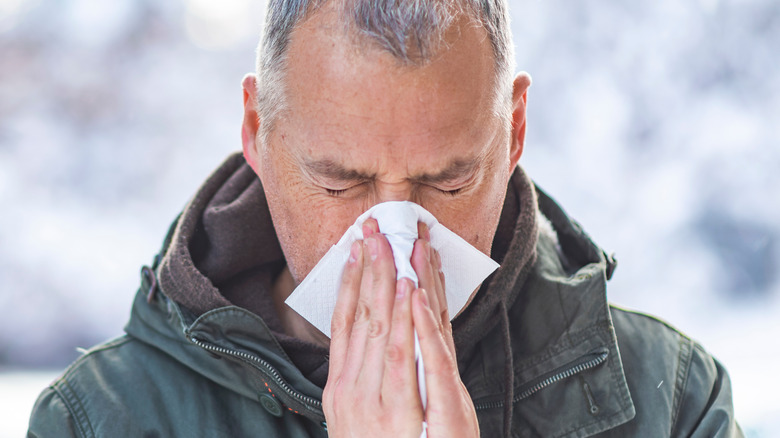The Real Reason Your Nose Runs When It's Cold
Our body responds to the cold in many ways. We shiver, our teeth may chatter, and for many of us, our nose starts running once we step out into that frigid winter air. You're not sick and it's not allergy season, so what could be causing this sudden need for a tissue?
Sometimes referred to as skier's nose, researchers from a 1991 two-part study published in Annals of Allergy took a closer look at the condition, clinically known as cold-induced rhinorrhea (CIR). Self-reported data from 90 medical patients at a ski resort clinic revealed that 96% of participants experienced some level of CIR in response to the cold, with nearly half reporting more severe CIR symptoms. While cold-induced rhinorrhea can affect anyone, CNN reports that those with eczema, asthma, or hay fever tend to be more susceptible to the condition. With skier's nose proving to be such a common condition, what is it about the cold that prompts our body to respond with mucus as its first line of defense?
Tasked with keeping our lungs free of bacteria, the nose produces mucus to keep our airways void of contaminants, reports The Healthy. "In cold weather the cilia, the tiny oars that move mucus along, are slowed," Dr. Murray Grossan of the Grossan Sinus and Health Institute tells the publication. As a result, the nose kicks into overdrive to keep mucus flowing to prevent bacteria from accumulating in the nasal passages.
How to prevent skier's nose
The temperature of the air at the back of our nose stands roughly between 79 degrees and 86 degrees Fahrenheit when we breathe in cold air (per CNN). Coupled with nearly 100% humidity, the nose also functions to keep the inner environment of our nose moist in order to prevent it from drying out when exposed to cold air (via Ohio State University Wexner Medical Center). In response to the cold, the blood vessels in our nose expand and enlarge which prompts mucus production to keep the nasal cavity warm and cozy.
While skier's nose is generally not a cause for concern, those who experience an excessively runny nose may be prescribed a medication known as ipratropium bromide, which limits mucus production, according to the Ohio State University Wexner Medical Center. Otherwise, Dr. Murray Grossan suggests doing what you can to keep your nose nice and toasty during cold weather conditions. "Rub your hands together, and then breathe into cupped hands or inhale steam from hot green tea and drink it, as green tea stimulates cilia," Dr. Grossan tells The Healthy. Alternatively, Dr. Deborah S. Clements of Northwestern Medicine says wearing a scarf while outdoors can also help prevent a wintertime runny nose.


